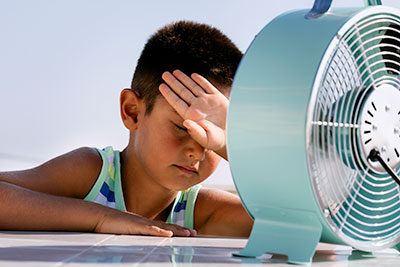Growing Up Amid Climate Change: Impact on Children’s Mental Health
Abstract

While there is a growing amount of research on the effects of climate change on mental health, there remains a significant knowledge gap on how to address its impact on child and adolescent mental health.
The long-term consequences of climate change can instill strong emotions of worry, guilt, and hopelessness. Children are disproportionately impacted by climate change due to their immature physiology and dependence on adults, according to a 2015 report in Pediatrics. While some children may experience anxiety, fear, sadness, sleep disruption, distressing dreams, irritability, difficulty concentrating, and anger outbursts during and after an extreme climate event, others may develop anxiety, depression, and posttraumatic stress disorder after such an event. Mental stress during and after an extreme climate event can be harder on children because they understand less about the event, feel less able to control events, have less experience coping with difficult situations, and are less experienced at expressing their feelings than adults.
A 2022 review in Frontiers in Psychology on climate change’s impact on child mental health found that youth from vulnerable communities or communities with strong ties to the land, such as Indigenous communities, are more often identified as having significant eco-anxiety and other mental health symptoms.
Exposure to climate change can impact mental health of children across all ages in different ways. According to the “Mental Health and Our Changing Climate Children and Youth Report 2023,” children experienced more anxiety, sleep troubles, PTSD, disrupted cognitive development, and major depressive disorder related to climate change, whereas adolescents experienced more chronic and indirect impacts from climate change such as added stress from disrupted schooling, family and financial stress, displacement, and food insecurity and had a more comprehensive understanding of dire climate outlooks. These chronic and indirect impacts lead to depression, strained social relationships, lower levels of self-control, climate-related anxiety, and suicide.
According to the World Bank Group, research estimates that more than 216 million people could be forced to migrate by 2050 due to water scarcity and threatening of agricultural livelihoods. Young adults and children experience migration at a higher rate than others. It is well known that migration is a stressful and traumatic experience that includes exposure to deadly experiences during and afterward. Migration due to climate change can cause significant psychological stress secondary to loss of social and family support, pressure of adaptation, economic hardships, and discrimination resulting in poor mental health outcomes in migrants.
Child and adolescent psychiatrists have a unique role to support youth and their parents who are affected by climate change. While caring for children with climate anxiety, child and adolescent psychiatrists can provide a safe space to acknowledge children’s fears and help process their emotions providing hope. It is important to educate parents so they can cope with their children’s strong emotions about climate change and provide effective support. Resources should be given to families to seek assistance from mental health professionals if symptoms continue to persist.
In November 2023, the Biden-Harris administration took bold steps to tackle climate crisis by building a clean energy economy and enhancing environmental justice. As mental health professionals, it is imperative to be aware and support federal and state initiatives to address eco-crisis. Clinicians can also get involved within their health care systems to achieve goals of decarbonization.
It is time to integrate specific training and curricula about climate change within medical schools and residency programs. Educating child and adolescent psychiatrists about climate change will prepare them to help children work through their eco-anxiety and instill them with hope. ■




